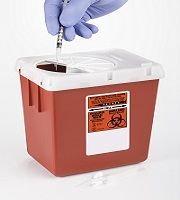C. difficile Infection Risk Associated with Sharps Containers
The majority of hospitals included in a recent analysis use reusable sharp containers, a practice that is linked to higher incidence of Clostridium difficile (C. diff) infection.

The majority of hospitals included in a recent analysis use reusable sharp containers, a practice that is linked to higher incidence of Clostridium difficile (C. diff) infection.
C. diff is a potentially deadly infection and uncovering key contributing factors is crucial. Monika Pogorzelska-Maziarz, PhD, MPH, from Thomas Jefferson University in Philadelphia, PA analyzed the use of single-use and reusable sharps disposal containers in hospitals. The analysis concluded that one is significantly more likely to be associated with more frequent C. diff infections.
“This is the first study to show a link between use of single-use sharps containers and lower C difficile rates,” said the study published in American Journal of Infection Control.
A total of 539 hospitals with an average of 289 beds completed a survey addressing the use of sharps disposal containers. Of those hospitals, 72% reported using reusable sharps containers and data showed that they had more C. diff cases.
“In bivariate regression, hospitals using single-use containers had significantly lower rates of C difficile versus hospitals using reusable containers (incidence rate ratio [IRR] = 0.846, P = .001),” the study said. “This relationship persisted in multivariable regression (IRR — 0.870, P = .003) after controlling for other hospital characteristics.”
The Centers for Disease Control and Prevention (CDC) reported that of the estimated half a million C. diff infections in 2011, 29,000 patients died within 30 days of diagnosis. Although advancements have been made — such as new tests to detect the C. diff in children — the issue still persists.
“Future research should investigate the potential for environmental contamination of reusable containers and the role they may play in pathogen transmission,” the report concluded.